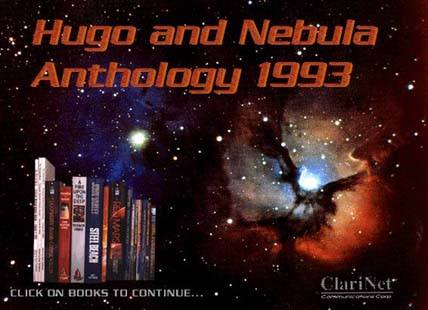Home
Hugo - Nebula Anthology 1993

In 1993 the Hugo Awards and Nebula Awards
winning stories were collected into a CD-ROM anthology, along with an archive of the very popular
rec.humor.funny newsgroup, by Brad Templeton, the moderator of r.h.f.
For a while the CD-ROM was available from Brad in exchange for an EFF donation,
although there were not very many of them in existence and who has a CD drive anymore?
This is unfortunate, since as Brad wrote, it might have been the "world's first major eBook":
I believe this CD is now a piece of history, as the world's first major eBook project using current fiction. At the time it was the largest anthology of current fiction ever published in one volume, and it may retain that title even today. Prior ventures were small or featured either unpublished writers or public domain works. This anthology featured novels that in most cases had not yet come out in paperback.
Luckily, the Internative Archive has a version, which was found in a personal USENET archive. Also luckily, most of the files were stored in a relatively standard RTF, allowing conversion to more modern formats.
Hypertext "Fire Upon the Deep"
In his rec.arts.sf.written USENET post announcing the anthology (available via FTP or CD=ROM), Brad mentioned that
one of the special features on the CD was an "Annotated version of 'A Fire Upon the Deep' with over 70,000 words of author's notes detailing the book's development at every step, done in hypertext":
Of course, the other exciting thing to develop as we worked on this project was the special version of A Fire Upon the Deep. Initial discussions with Vernor Vinge revealed that he had, like a programmer, embedded vast numbers of "comments" into the text of his novel, then stripped them out before sending it to Tor Books. They remained in his original electronic manuscript. In A Fire Upon the Deep there are notes for most of the paragraphs. ... Of course, some of the notes are boring, administrative things, but some give you a fascinating window into the development of the novel and the author's thoughts as he wrote it.
Vinge's introduction to the hypertext edition has a fascinating call "the future of annotations", in which he hopes for an online,
collaborative, history-tracking text editor so that authors can work with their editors, their
reviewers. He also hopes that this would allow future scholars to better understand the author's
process, and hopes that his notes (written in emacs and tracked with grep) will be as
useful as marked-up manuscripts were for studying the works of prior authors.
He also thanked "Ted Nelson's ideas and the work of the Xanadu people", and looked forward
to the day when these sort of hypertext books more common.
In the readme.txt, Brad wrote:
We will also be preparing a version of this novel in HTML format, the hypertext SGML variant used by World-Wide-Web browsers, such as NCSA XMosaic. If you don't have MS Word, but do have that program, you may wish to investigate it.
While that version never materialized, and you probably can't run XMosaic any more, this site is a realization of Brad and Vinge's hypertext version, almost thirty years later.